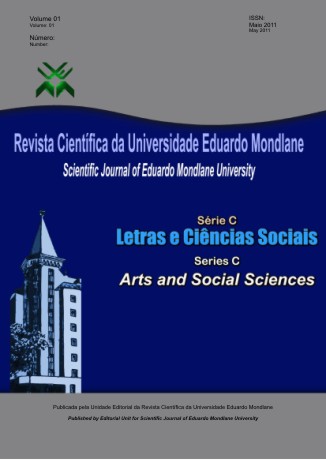THE “KING OF RADIO” AND THE KING OF MARRABENTA: Fany Mpfumo as intermediary between two African worlds and the construction of an icon
Keywords:
Fany Mpfumo, marrabenta, popular music, mozambican cultural policAbstract
By examining aspects of Fany Mpfumo’s biography and artistic career, accessed from printed sources, I will seek to answer the following questions: what were the decisive factors for the transformation of António Mariva into Fany Mpfumo? What processes allowed him to become the most important icon of “urban popular music” (SOPA, 2014) in Mozambique, revered even today? Why, despite having become an icon, has its reach and that of marrabenta been little reflected in the country’s official cultural heritage policies, with this music being considered one of the symbols of national identity (FILIPE, 2012)? To face them, I will recover in the text aspects of Fany Mpfumo’s life and work in light of his social transit between South Africa and Mozambique and the role of the phonographic and radio broadcasting industry in his career. From a theoretical point of view, I will dialogue with studies on popular culture in Africa (TRAJANO FILHO, 2018; SOPA, 2014; CHARRY, 2012; MARTIN, 2002; BARBER, 1997; FABIAN, 1978) to understand the dynamics that allowed the emergence of marrabenta in Lourenço Marques and the role occupied by Fany Mpfumo in this movement.
References
ARPAC. Mafalala: das origens à actualidade. Maputo: Académica, 2017.
BARBER, K. Introduction. In: BARBER, K. (ed.). Readings in African Popular Culture. Bloomington: Indiana University Press, 1997.
BARBER, K. A History of African Popular Culture. New York: Cambridge University Press, 2018.
CHARRY, E. Music for an African Twenty-First Century. In: CHARRY, E. (ed.), Hip Hop Africa: New Modern Music of Globalizing World. Bloomington: Indiana University Press, 2012.
COELHO, T. Dicionário crítico de política cultural. São Paulo: Iluminuras, 1997.
CRAVEIRINHA, J. O Folclore Moçambicano e as suas Tendências. Maputo: Alcance Editores, 2009.
DOSSE, F. O Desafio Biográfico: escrever uma vida. São Paulo: Editora da Universidade de São Paulo, 2009.
FABIAN, J. Popular Culture in Africa: findings & conjectures. Africa, n. 48 (4), p. 315-334, 1978.
FILIPE, E. P. V. “Where are the Mozambicans Musicians?”: Music, Marrabenta and National identity in Lourenço Marques, Mozambique, 1950s-1975. Tese (Doutorado em Filosofia) – University of Minnesota, 2012.
FILMFORM (Lisboa) e INC/Instituto Nacional do Cinema (Maputo). Filme Música, Moçambique!. Lisboa e Maputo: Fundação Calouste Gulbenkian e pelo Instituto Português de Cinema, 1981.
ISAAK, A. M. “Fany Mpfumo, o Rei do Cancioneiro Moçambicano”. In: PRISTA, António (org.). Songbook Fany Mpfumo. Maputo: Khuzula, 2018.
KRUKS, S. From Nationalism to Marxism: the ideological history of Frelimo, 1962-1977. In: MARKOVITZ, I. L. (ed.). Studies in Power and Class in Africa. New York: Oxford University Press, 1987.
LARANJEIRA, R. A Marrabenta: sua evolução e estilização, 1950-2002. Maputo: Minerva Print, 2014.
MARTIN, P. Leisure and Society in Colonial Brazzaville. Cambridge: Cambridge University Press, 2002.
MARZANO, A. Nem todas as batalhas eram de flores: cotidiano, lazer e conflitos sociais em Luanda. In: NASCIMENTO, A.; BITTENCOURT, M.; DOMINGOS, N. e MELO, V.A. (orgs.). Esporte e Lazer em África: Novos Olhares. Rio de Janeiro: Viveiros de Castro Editora, 2013.
MENDES, O. Música tradicional em festa nacional. Tempo, nº 533, p. 48-51, 1980.
MENDES, P. Popular Music in a colonial city: musicians’ experiences and socio-racial issues in Lourenço Marques (1960-75). Post-ip: Revista do Fórum Internacional de Estudos em Música e Dança, n. 5, p. 143-152, 2019.
MIGUEL, A. Marrabentar: vozes de Moçambique. Maputo: Marimbique, 2005.
MORAIS, S. S. O palco e o mato: o lugar das timbila no projeto de construção da nação em Moçambique. Tese (Doutoramento em Antropologia Social) – Departamento de Antropologia, Universidade de Brasília, 2020.
MORAIS, S. S. As timbila de Moçambique no concerto das nações. Dossiê Patrimônio e Relações Internacionais. LOCUS:
Revista de História, v. 26, n. 2, p. 261-290, 2020.
NEWITT, M. A History of Mozambique. Bloomington and Indianapolis: Indiana University Press, 1995.
PEREIRA, M. S. Grandiosos batuques: tensões, arranjos e experiências coloniais em Moçambique (1890-1940). Lisboa: Imprensa de História Contemporânea, 2020.
REIS, E. T. dos e BARREIRA, I. A. Alusões biográficas e trajetórias: entre esquemas analíticos e usos flexíveis. BIB, São Paulo, n. 86, p. 36-67, 2018.
RITA-FERREIRA, A. O Regresso de Fany Pfumo. In: http://www.antoniorita-ferreira.com/pt/editoriais-em-journais-periodicosimprensa-nao-cientifico/27-o-regresso-de-fany-mpfumo. Acesso em: 28 de fevereiro de 2021.
SOPA, A. A Alegria é uma Coisa Rara – Subsídios para a História da Música Popular em Lourenço Marques (1920-1975). Maputo: Maçambique, 2014.
TRAJANO FILHO, W. Influence and Borrowing: Reflections on Decreolization and Pidginization of Cultures and Societies. In: KNÖRR, J. e TRAJANO FILHO, W. (eds.). Creolization and Pidginization in Contexts of Postcolonial Diversity. Leiden/Boston: Brill, 2018.
VELHO, G. e KUSCHNIR, K. Apresentação. In: VELHO, G. e KUSCHNIR, K. (orgs.). Mediação, cultura e política. Rio de Janeiro: Aeroplano, 2001.
WANE, M. Marrabenta: as dinâmicas históricas e socioculturais no contexto do seu surgimento. Africana Studia, nº 34, p. 117-130, 2021.





